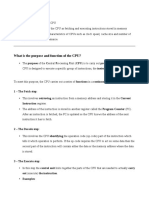0% found this document useful (0 votes)
35 views2 pagesOCR Computer Science 1.1 Notes Updated
The document explains the Central Processing Unit (CPU), its main components including the Control Unit, Arithmetic Logic Unit, and various registers, and outlines the Fetch-Decode-Execute cycle that the CPU uses to process instructions. It also discusses the Von Neumann architecture, which combines data and instructions in one memory, and factors affecting CPU performance such as clock speed, number of cores, and cache size. Additionally, it describes embedded systems as specialized computers designed for specific tasks, contrasting them with general-purpose PCs.
Uploaded by
sanchitjoshi2507Copyright
© © All Rights Reserved
We take content rights seriously. If you suspect this is your content, claim it here.
Available Formats
Download as PDF, TXT or read online on Scribd
0% found this document useful (0 votes)
35 views2 pagesOCR Computer Science 1.1 Notes Updated
The document explains the Central Processing Unit (CPU), its main components including the Control Unit, Arithmetic Logic Unit, and various registers, and outlines the Fetch-Decode-Execute cycle that the CPU uses to process instructions. It also discusses the Von Neumann architecture, which combines data and instructions in one memory, and factors affecting CPU performance such as clock speed, number of cores, and cache size. Additionally, it describes embedded systems as specialized computers designed for specific tasks, contrasting them with general-purpose PCs.
Uploaded by
sanchitjoshi2507Copyright
© © All Rights Reserved
We take content rights seriously. If you suspect this is your content, claim it here.
Available Formats
Download as PDF, TXT or read online on Scribd
/ 2


























































